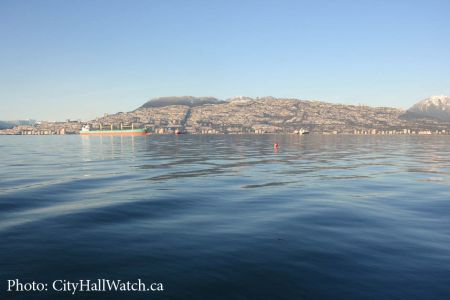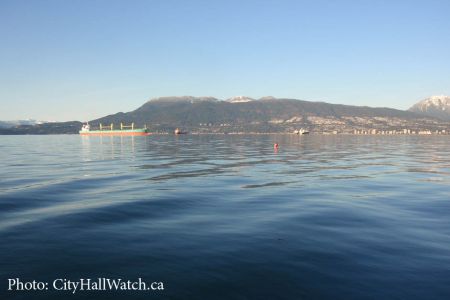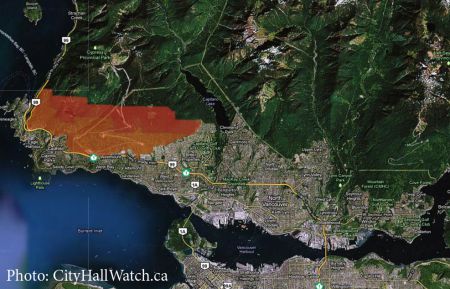STORY about HousingEnvironmentpublié le Janvier 8, 2011 by Joseph Jones
January 2011: Vancouver Changed Forever?
Red Circle the 20th!
Also posted by Joseph Jones:
Also in Environment:
Three big uglies are out to change Vancouver forever, all in the space of one month. The coming two weeks are critical. Speculators and developers have launched a three-front assault on existing restrictions. Their not-so-secret weapons are holiday surprise and boring bureaucratic camouflage.
Number One: Steroid skyscrapers. Vancouver Views was supposed to sneak its way through City Council (Item 3 on Agenda) on 16 December 2010. With a report made public only three working days ahead, in the week before Christmas, the planner-developer axis hoped for a quiet little fait accompli. Thanks to the vigilance of folks at CityHallWatch and their allies, the City of Vancouver was forced to blink. The many speakers that signed up for December 16 rapidly found themselves shunted off to 20 January 2011. That one-month reprieve gives everyone a chance to learn more by attending a public forum on Extremely Tall Towers.
Number Two: Downtown Eastside wipeout. Residents and friends of the Downtown Eastside participated extensively in the Historic Area Height Review and then went to City Council when the results were considered on 26 January 2010 (Item 1 on Agenda).
This is what Wendy Pedersen of the Carnegie Community Action Project (CCAP) had to say in a recent email:
Our opposition … may have helped keep council from supporting even more high buildings and thus we may have slowed the bad ripple effects of gentrification. … At least we didn’t get sixteen 30-story towers as first proposed – now it looks like seven 15 story towers.
Subsection C.3 of the complex motion from a year ago called for "a social impact study ... to assess the effect on the existing low-income community" and to identify "opportunities for enhanced affordability and liveability." Recent attempts to rush that study to completion failed. It appears that Council wants to plow right ahead and approve zoning and policy changes to implement the taller buildings. Haste is making their in-progress social impact study look like a throwaway gesture.
The date for this item to go to Vancouver City Council will also be 20 January 2011. In response, CCAP is now gearing up to get as many speakers as possible to support a "hold off" on the seven fifteen-story towers projected for the Chinatown and Victory Square areas of the DTES "until the assets and tenure of the low-income community are secure."
Number Three: Sprawl growth everywhere. In late 2010 Metro Vancouver held poorly advertised public hearings on its Regional Growth Strategy in Coquitlam, North Vancouver, Surrey, and Burnaby. They really did not want to hear from the area's 2.1 million residents. (Why else was there no meeting in Vancouver?)
The Regional Growth Strategy is out to replace the 1996 Livable Region Strategic Plan. Notice just from the titles how Metro Vancouver wants to scrap the "livable" and bring on the "growth." (When prospective development profits loom, the agenda loses all shame.) Forget sustainable, forget livable. The big-bucks vision for what used to be called the Greater Vancouver Regional District (Maple Ridge to Bowen Island) is sprawl growth.
The Regional Growth Strategy offers a blueprint for removing land from the agricultural reserve and for extending the urban containment boundaries of the Metro Vancouver region. Perhaps the most dramatic land grab would see northwestern boundaries push much further toward the Capilano watershed and Cypress Provincial Park. The implications of that boundary shift generates the graphic shock of the header photo for this article: potential sprawl photoshopped over the threatened portion of the North Shore mountains.
The schedule for a vote on this radical remake of our 2820 square kilometers of planet Earth was released on 7 January 2011. The Metro Vancouver agenda for the upcoming 14 January 2011 meeting recommends approval of the Regional Growth Strategy after only minimal amendment. Their comment on the amending? "Generally, the proposed changes are to increase clarity on existing content or to correct errors, and the changes are not substantive in content" (RD-206).
To the extent that the so-called public hearing did in fact hear from people, it heard mostly opposition and expression of concern. (See digest appended below.) But the backroom bureaucrats are still trying to romp ahead with what they want to do, no matter what anyone says.
CityHallWatch has issued a position statement that calls for more deliberation, and that calls on you to bombard your elected officials with what you think. Immediately.
Background That You Can Trust on the Regional Growth Strategy:
Metro Vancouver's New Draft Regional Growth Strategy Raises Concerns
Metro Vancouver's Regional Growth Strategy Greenwashes Unsustainable Development
Digest of Response to Public Hearings
(Source: Metro Vancouver agenda)
36 written submissions: 35 in opposition or expressing concerns, 1 in support.
33 speakers: 16 in opposition or expressing concerns, 13 from UBC, 4 in support.
Page RD-20 shows 16 written submissions, all summarized as oppose. Page RD-21 shows 4 speakers, three in opposition, and one in favour but also raising concerns and suggesting amendments. Page RD-23 shows 3 written submissions, all summarized as expressing concerns. Pages RD-23/24 show 6 speakers, all in opposition and/or expressing concern and/or requesting clarification. Page RD-25 shows 4 written submissions, three summarized as expressing concerns and one as oppose. Pages RD-25/26 show 5 speakers, two in opposition, one both expressing support and conveying concerns, one both in favour and expressing concerns, and one expressing concern. Page RD-28 shows 1 written submission, summarized as expressing opposition. Page RD-28 shows 2 speakers, both expressing concerns. Page RD-30 shows 12 written submissions, seven summarized as expressing concerns, four in opposition, and one expressing support. Pages RD-30/34 show 16 speakers, all but three from UBC. Notable among this comment was a desire to see UBC designated as an "urban centre," and a City of Vancouver representative stating support "to move the RGS toward … final approval in 2011." Of the remaining two, one spoke in opposition and one expressed concern.
The site for the Vancouver local of The Media Co-op has been archived and will no longer be updated. Please visit the main Media Co-op website to learn more about the organization.



Commentaires
Excellent summary
Joseph Jones has done an excellent summary of these critical issues. January 2011 is a critical month in the history of this whole region--January 20 for Vancouver, and January 14 for Metro Vancouver and every municipality in the region, just as his article states. Will our elected officials and public servants do the right thing? We shall know the answer very soon. And elections are coming, so citizens must watch their actions (more than their words) carefully.